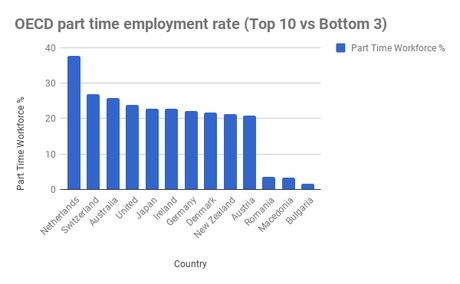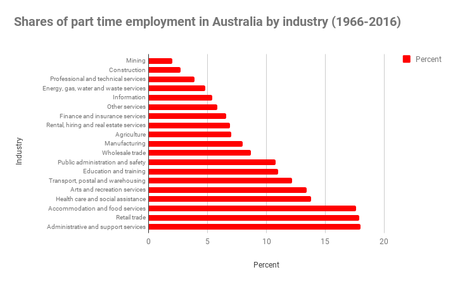One of the key areas in our industry that gets very little attention is that of part time employee benefits. Part time and casual workers have long been features of every developed labor market in the world, and their numbers have been growing in the past decade - often at the expense of full-time employment. The problem here is, offering employee benefits to part time workers can be tricky. Requirements can often depend on the labor laws of the countries you operate in, as well as the type of company you are.
This week, Pacific Prime discusses the ins and outs of part time employee benefits, along with reasons why extending benefits to part timers can be a great move.
Part time employees - understanding the numbers

In terms of pay, shows the average base pay per year for part timers in the United States is USD 24,500, compared with USD 41,245 for full time employees. For the UK, median hourly earnings of part time employees rose from GBP 7.00 in 2006 to GBP 8.88 in 2016, while the full time median rose GBP 11.03 to 13.59 in the same period. Even in countries often viewed with progressive and generous social programs, Danish women are still found to earn less than men - and those with children even less so.
The reality of the job for non-full time employees
- Aren't as readily available as full-time workers (47%)
- Lack commitment to their company (38%)
- Are a burden to their full-time colleagues because of their "absence" (36%)
- Aren't working if they're "not seen in the office" (35%)
Some of this can stem from legislative minimum working requirements that part time workers can fall short of being eligible for. Other reasons are simply because part time employee benefits haven't really been "a thing" employers have had to consider before. The time is coming, however, for the conversation to be had in non-traditional part time sectors.
The rise of part time roles in professional services

This included the Trend Director of Amazon in Europe working 4 days per week, the R&D Director of Coty Luxury working 3.5 days, and a co-led Head of External Affairs role where two women worked 3 days per week for Age UK. Laurie Padua, Global Director of Technology at Alexander Mann Solutions, leads a team of 45 senior colleagues over a 3-day week, and manages clients including EY and Citi.
Offering part time employee benefits: Why should we?
With many industries seeing an increase in part time positions now would be a good time to recognize and reward your part time employees with employee benefits. Of course, doing so will largely depend on your budget, your company goals and values, and the type of work your non-full time staff carry out for your business. Regardless of these considerations, here are some reasons you might want to consider extending part time employee benefits out to those workers.
1. Workers value benefits and perks
For part time workers, providing them with valuable perks can have the added bonus of creating a perception of equality with full-time staff. Granting health insurance, for example, to a return-to-work mother can often be more valuable to her and her family for its ability to reduce household spending on medical care.
2. Benefits engender employee loyalty

3. Addressing the gender pay gap
Because we know that the majority of part time workers are women, and that part time staff often receive less in hourly wages than their full time counterparts, any move to open access and increase compensation via employee benefits for part time staff would go some way to address gender pay gaps.
What else should I know about offering part time employee benefits?
There are two things to keep in mind if you have part time employees; the first is whether or not their work arrangements meet your local legal requirements for being eligible for certain workplace benefits, and the second is about how part time workers are treated by employee benefits and wellness program providers.
Paying for part time employee benefits, generally and unfortunately, does not come with a discount. Despite working reduced hours or days for your company, granting them access to employee benefits means doing so at the same price as full time staff. This may seem unfair if comparing time worked versus benefits received, but it may simply be a case that your company has decided to value their contribution equally to those of full time staff.
How can I get assistance with weighing up offering part time employee benefits?
Your decision to grant perks to your part time staff will be one you'll need to make yourself, but having an experienced employee benefits broker can help you do so with confidence. Our consultants and advisors have an intimate understanding of how employee benefits and wellness programs work, have access to current and accurate multi-jurisdictional knowledge, and can provide you with the best analysis of your benefit options in the market.
The team has an unparalleled market advantage as we work with a range of industries, with groups as small as start ups to multinational professional service firms. We have a presence in most major expat locations, six global offices in total, and are partnered with many of the biggest insurance and benefits players in the market.
If your desire is to stay competitive in the market whilst ensuring your employee benefits plan remains sustainable, Pacific Prime is the insurance partner you want in your corner. Contact our team to arrange a meeting, or visit our website to learn more about how we simplify insurance .
